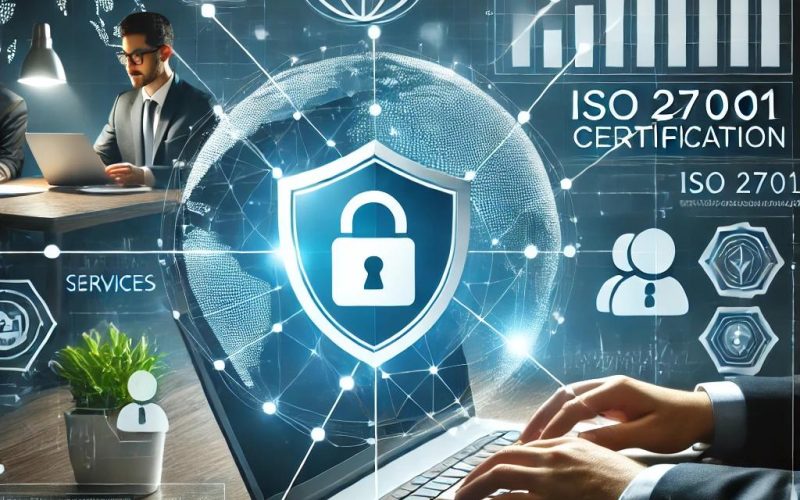Introduction
In today’s digital landscape, sensitive data is everywhere. From your credit card information when you shop online, to your health records at a clinic, we’re all entrusting businesses and organizations with our most private information. And with cyberattacks becoming increasingly sophisticated, it’s no surprise that managing data securely has never been more important. But how can organizations ensure they are protecting this data the right way?
The answer lies in ISO 27001 certification. This internationally recognized standard helps organizations build, maintain, and continually improve an Information Security Management System (ISMS). For businesses dealing with sensitive data—whether you’re an e-commerce giant, a healthcare provider, or a third-party vendor—this certification isn’t just about compliance. It’s about trust, reputation, and safeguarding your operations from risk.
So, whether you’re handling personal data, health records, or financial details, let’s explore why ISO 27001 is crucial and what it really means for different types of organizations.
What Exactly is ISO 27001 Certification?
Before we jump into the specific types of organizations that benefit from this certification, let’s break down what ISO 27001 is all about.
ISO 27001 is an international standard that outlines how organizations should manage sensitive information. The goal? Protect it—whether it’s from cybercriminals, data breaches, or simple internal mishaps. Think of it as a blueprint for how to put in place policies, procedures, and controls to secure your information and minimize risk.
While it’s clear that industries like finance, healthcare, and e-commerce deal with sensitive data, what may not be as obvious is that the ISO 27001 framework can be adapted across various industries. Whether you’re managing patient data or customer details, the principles of ISO 27001 help ensure your data security is up to the highest standards.
E-Commerce Businesses: Protecting Your Customers’ Trust
In e-commerce, sensitive data is a lifeblood. From credit card numbers to personal addresses, online businesses collect a lot of private information. And if this data gets into the wrong hands, you’re not just facing legal consequences—you could also lose customer trust, which is harder to get back than it is to lose.
ISO 27001 certification ensures that e-commerce businesses are putting in the necessary processes to protect customers’ personal data. It’s more than just a box to tick. With ISO 27001, you’re showing your customers that you take their security seriously, that their sensitive information won’t be exposed due to a simple oversight.
You know what? It’s easy to think “It’ll never happen to us,” but consider this: 43% of cyberattacks target small businesses. No one’s exempt, and that’s why ISO 27001 can be a game-changer. It helps e-commerce businesses implement proper encryption, access controls, and incident response plans—protecting both the business and the customer. And when you can advertise your certification, it gives you a competitive edge, standing out in a crowded market.
Healthcare Organizations: Safeguarding Patient Data
The healthcare industry handles some of the most sensitive personal information there is: health records. A single data breach could expose a person’s medical history, treatment plans, and even social security numbers. For a healthcare provider, this isn’t just a data security issue—this is a matter of patient trust and privacy.
Here’s the thing about ISO 27001 for healthcare organizations: it ensures that there’s a systematic approach to managing sensitive patient information. This means enforcing strict access controls, ensuring data is securely stored, and having a clear, actionable plan in case of a breach. The certification also helps in complying with regulatory requirements, like HIPAA in the U.S., that demand high standards of data protection.
For healthcare providers, ISO 27001 is a commitment to providing the safest environment for patient data. Whether it’s ensuring that sensitive information is properly encrypted or setting up secure communication channels, ISO 27001 certification is a stamp of approval for your organization’s commitment to cybersecurity.
Third-Party Vendors and Contractors: The Unsung Heroes of Data Protection
Third-party vendors and contractors often have access to sensitive data, yet they are frequently overlooked when it comes to data security. But think about it—if a third-party provider has access to your system and their security measures are lacking, then your whole operation is at risk. Even if your own security protocols are tight, a weak link in the supply chain can lead to disaster.
This is where ISO 27001 certification becomes incredibly valuable for vendors and contractors. When vendors are ISO 27001 certified, it provides an assurance that they are following the same strict security standards as you are. It becomes a measure of trust that everyone involved in the supply chain is taking data security seriously.
Having ISO 27001 certification also ensures that third-party vendors are adhering to key data protection principles like transparency, confidentiality, and risk management. This is especially important for industries where breaches can have severe consequences, like healthcare and finance.
The Benefits of ISO 27001 Certification
So, why should your organization bother with iso 27001 certification The benefits are plenty—and beyond just ticking boxes for compliance. Let’s break down the advantages:
1. Enhanced Security and Risk Management
ISO 27001 forces organizations to take a step back and assess where their vulnerabilities lie. Once you identify those risks, you can take proactive steps to mitigate them. This reduces the likelihood of a data breach and the consequences that come with it.
2. Increased Customer Confidence
Trust is everything in business. When your customers know you’re ISO 27001 certified, they can rest assured that you’re doing everything in your power to protect their sensitive information. In an era of data breaches, that kind of reassurance is invaluable.
3. Regulatory Compliance
For many industries—like healthcare and finance—compliance with regulatory requirements is non-negotiable. ISO 27001 helps organizations meet regulatory standards, avoiding hefty fines and penalties that come with non-compliance.
4. Competitive Advantage
ISO 27001 certification isn’t just about security—it’s a strategic business move. When you’re certified, you differentiate yourself from competitors. In a crowded marketplace, being able to say you have robust security systems in place can be the deciding factor for customers.
5. Improved Internal Processes
ISO 27001 isn’t just about security—it’s about creating a culture of continuous improvement. By focusing on security as part of your day-to-day operations, you’ll build stronger, more efficient internal processes that can benefit the entire organization.
Getting ISO 27001 Certified: What’s Involved?
Achieving ISO 27001 certification isn’t an overnight process—it requires a systematic approach to evaluating and improving your organization’s information security practices. Here’s what it typically involves:
1. Conduct a Gap Analysis
Start by assessing where your organization currently stands in terms of data security. What are your existing practices? Are there any weaknesses? A gap analysis will help you identify areas that need improvement.
2. Develop Your ISMS
Next, you’ll develop an Information Security Management System (ISMS)—a set of policies, procedures, and controls that ensure your information is secure. This system should cover all aspects of data handling, from storage to access.
3. Implement the ISMS
Once the ISMS is in place, you’ll need to implement it across your organization. This involves training staff, establishing data protection policies, and ensuring everything is documented.
4. Conduct Internal Audits
Before you go for external certification, perform internal audits to ensure everything is running smoothly and complies with ISO 27001 standards.
5. Get Certified
Finally, an external auditor will assess your organization’s ISMS to ensure it meets all ISO 27001 standards. If you pass the audit, you’ll receive your certification.
Conclusion: ISO 27001 Certification is a Game-Changer for Sensitive Data
For organizations handling sensitive data—whether you’re an e-commerce business, a healthcare provider, or a third-party vendor—ISO 27001 certification offers a comprehensive, trusted way to protect the data that customers rely on. It’s about securing your data, your operations, and most importantly, your reputation.
As threats to data security continue to evolve, being certified isn’t just a nice-to-have—it’s a necessity. By adopting ISO 27001, you’re not only securing your sensitive information, but you’re also demonstrating your commitment to trust, transparency, and the ongoing protection of your stakeholders’ most valuable asset: their data.












